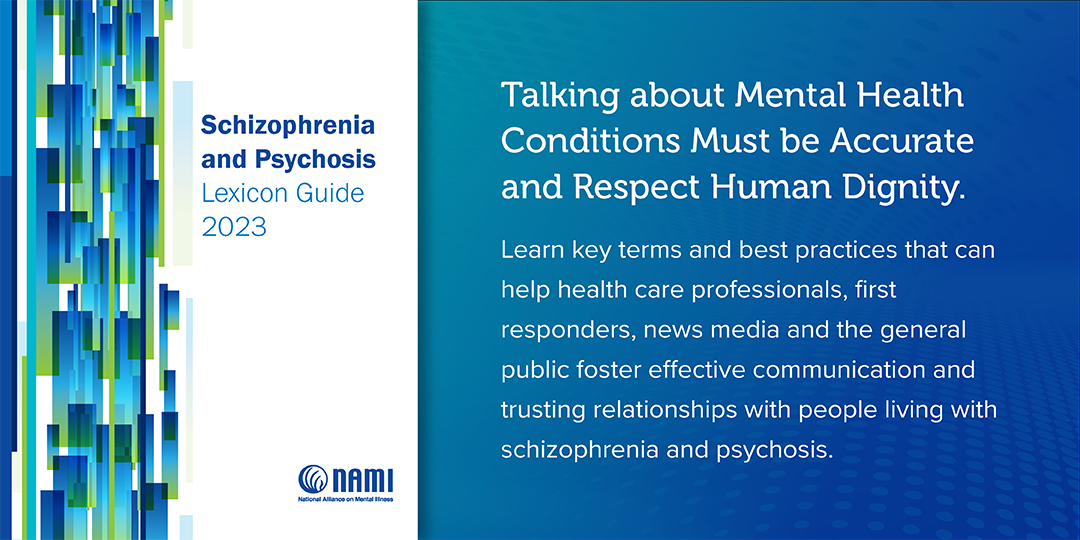
Language Matters: Shaping Mental Health Discussions with NAMI’s Schizophrenia and Psychosis Lexicon Guide
About the Guide
The National Alliance on Mental Illness (NAMI) introduces the Schizophrenia and Psychosis Lexicon Guide’s first edition, taking the necessary step to initiate crucial conversations around schizophrenia and psychosis.This guide highlights the significant impact of precise and empathetic language in mental health, advocating for accuracy, hope, and dignity. Tailored for a broad audience including clinicians, journalists, and family members, it seeks to elevate communication standards and combat the stigma often associated with mental illness. By presenting carefully selected terms, the guide encourages understanding and respect, grounding its approach in the real voices of those with lived experience – and allows room to evolve with future research, perspectives, and trends in language.

Enhance communication about schizophrenia and psychosis with our guide’s recommended terminology.

Our guide advises on terms to avoid, ensuring sensitive discourse around schizophrenia and psychosis.
Download the Guide
Embrace language’s transformative power in mental health with NAMI’s Schizophrenia and Psychosis Lexicon Guide. This essential resource provides context and guidance to support clarity, empathy, and respect in mental health discussions. Offering practical recommendations, it plays a pivotal role in enriching dialogues, reducing stigma and fostering strong connections with individuals experiencing schizophrenia and related conditions. Implement this guide in your practice, communications or everyday interactions, contributing to a more inclusive and supportive community. Start making a change— download the guide now and be part of the movement towards a more understanding and compassionate world.
Key Findings from The Guide
Explore the Key Findings of the NAMI Schizophrenia and Psychosis Lexicon Guide. Discover how language shapes treatment engagement, empowers individuals and supports caregivers and patient advocates in fostering understanding and reducing stigma in schizophrenia and psychosis care.
Contextual Language Use: Treatment professionals adapt their language based on the context, enhancing communication with peers and patients alike.
Empowerment Through Formal Terminology: For some patients, formal diagnostic language can offer patients authority and hope, indicating a pathway for treatment.
Challenges with Diagnostic Labels: Diagnostic terms can sometimes cause individuals to feel mislabeled or misunderstood, potentially hindering therapeutic relationships.
Individual Language Preferences: People may prefer personalized language reflecting their experiences over clinical terms, underscoring the importance of diverse term acceptance.
Importance of Personalized Engagement: Adapting to an individual’s language preferences enhances therapeutic relationships and supports recovery.
Broad Application: Beyond clinical settings, the guide helps law enforcement, media and families engage sensitively with individuals experiencing psychosis, advocating for accurate, non-stigmatizing language.
Quotes From the Guide
Psychosis is one of the hardest [conditions to de-stigmatize] because it’s been misrepresented in movies and entertainment…I wish that these people would stop…continually linking psychosis and violence over and over and over again.
Amy Cohen, Ph.D., SME Interview
[L]anguage is so culture dependent, person dependent that my first priority would be to make sure that we’re not… recommending some fixed process or fixed word but rather a way to communicate[.]
Lisa Dixon, M.D., MPH, SME Interview
It’s not just the words but how we think about things. And to me the ultimate goal of a lexicon is to improve communication. And the way you improve communication is by providing people with the tools to be open to listening and understanding what another person is communicating.
Alice Medalia, Ph.D., SME Interview
We talk about why it is important to take medications, stress strategies to remember to take medications, and give permission to miss doses without feeling like a failure. It’s important to set expectations and use language that gives room for mistakes. We all mess up taking medications, and you don’t have to feel like a failure if you forget or are not always adherent.
Deanna L. Kelly, PharmD, BCPP
Acknowledgements
This lexicon guide is the result of a collaborative and iterative process including a comprehensive literature review, interviews with subject matter experts, and focus groups of individuals and family members affected by schizophrenia and psychosis conditions. NAMI would like to thank The Hannon Group and our partners who made this project possible – demonstrating a collaborative commitment to enhancing mental health dialogue.






